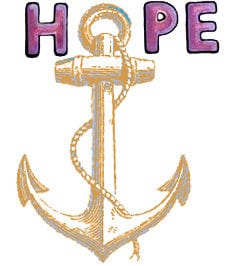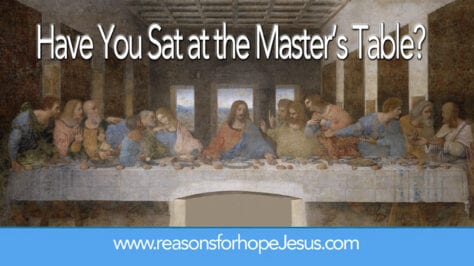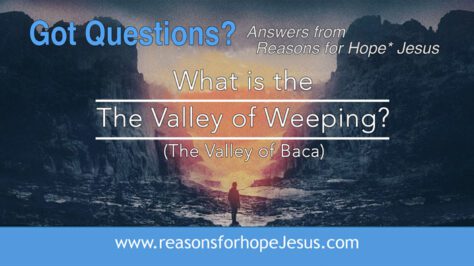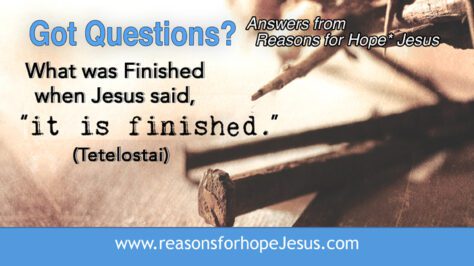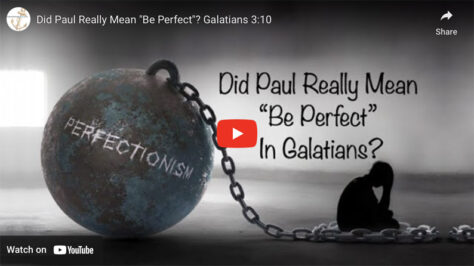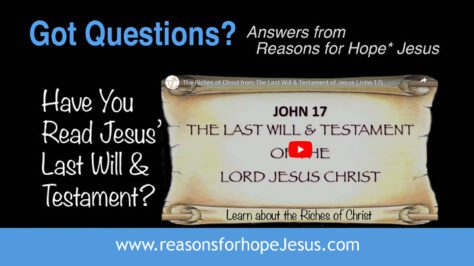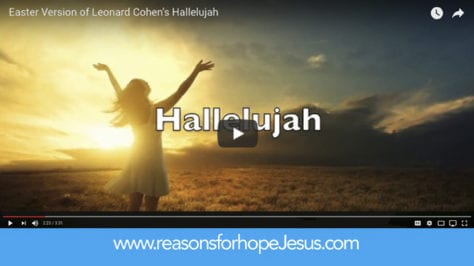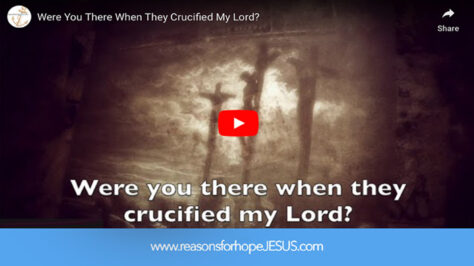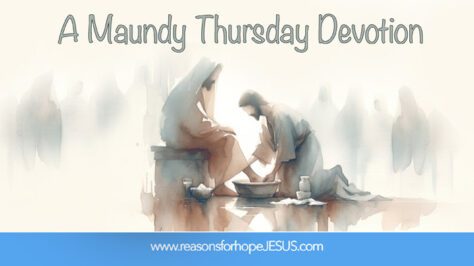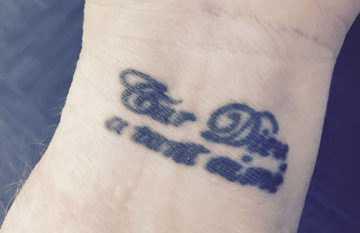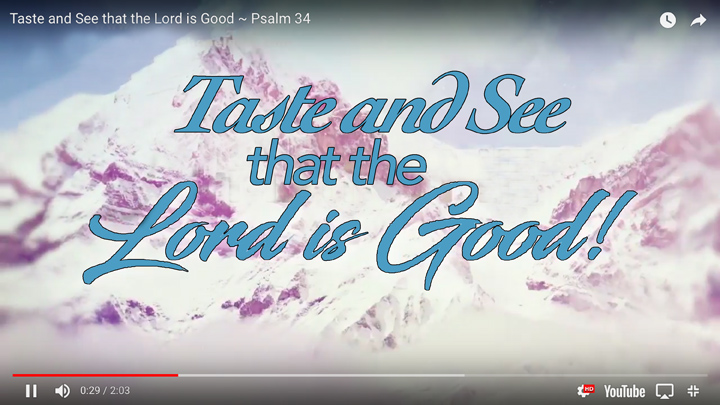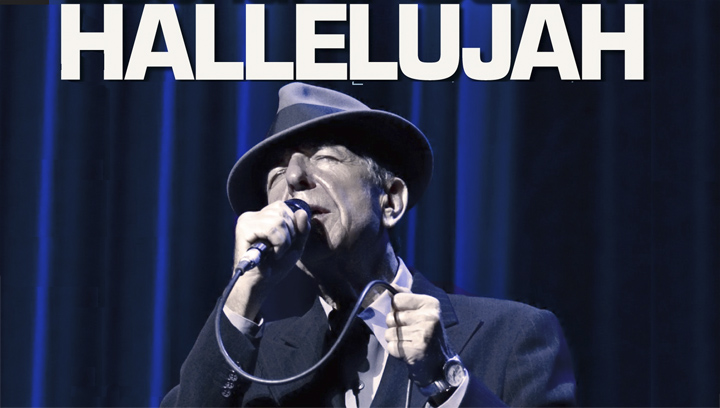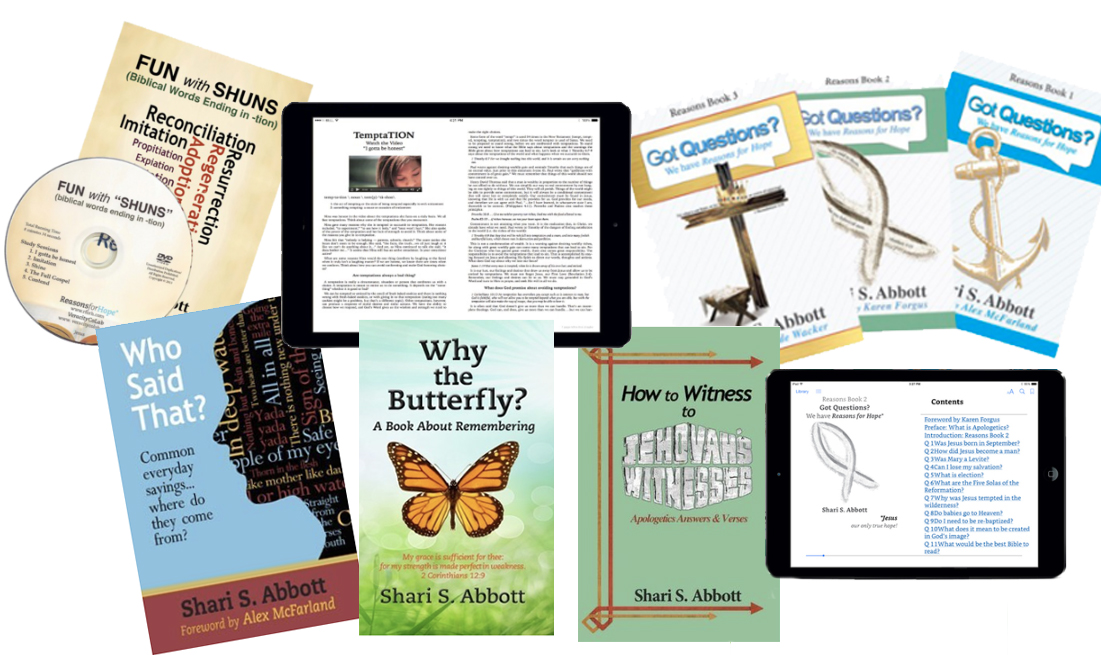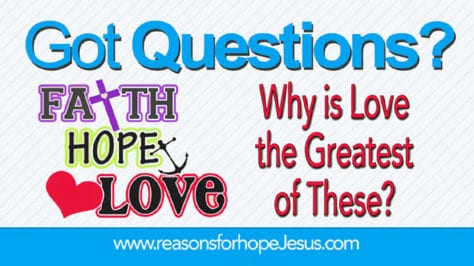
There are three very significant gifts from God that are mentioned in 1 Corinthians 13. Each of these gifts — faith, hope, and love — is both positional (in our justification) and practical (in our sanctification). Let’s define what that means.
Positional (Justification)
When we were justified and made new at salvation, we were positionally put into the Body of Christ, adopted into the family of God, made joint-heirs with Christ, and commissioned as His ambassadors. That’s who we are…positionally. (Read The Gift of SalvaTION: Justification & Imputation)
Practical (Sanctification)
Sanctification is the process of growing in holiness. It starts at the moment of salvation and contiues until them moment of death. It is an ongoing process. It is intended to be progressive. And it is for our good and God’s glory. (Read What you need to know about Sanctification & Glorification)
The Three Positional and Practical Gifts from God
In both our positional standing with God and our practical living for God, we receive three most significant gifts and we are told that love is the greatest of the three. Let’s look at each individually and then consider why love is the greatest.
1. Faith
Saving faith is a response to who God is. Understanding what faith is helps us to understand God’s gift to us that generates our response. Faith is defined as being progressive. It begins with knowing, progresses to believing, and, for those who choose to believe what they know, it results in trusting: Knowledge + Belief + Trust = Faith. (Read What is Faith? How do I get it? How do I grow it?)
Positional Faith
Ephesians tells us we are “saved by grace, through faith” (Eph 2:8). It is “not of works, lest anyone boast” (Eph 2:9). So how is faith a gift from God if it is our response?
The answer lies in understanding that the faith it takes to repent and trust Jesus is generated by the knowledge of God — the revelation of who He is and what He has done. God freely reveals Himself to the whole world. Our response in faith — of believing who God is and what He has done—is not a work. It is a free-will choice and it’s been such since the beginning of time when Adam and Eve were created with free-will.
The choice is simple: Believe God and respond in faith (trust), or follow after one’s own desires. God is a just God in that even the unbeliever has been given knowledge. Sadly they don’t believe or trust: Knowledge – Belief – Trust = No Faith. Failing to believe and trust God leaves one positionally outside of God. But saving faith places one at the foot of the cross, repentant of sins, and trusting in Jesus. Then God responds with the positional grace of salvation, washing away all sins and placing the forgiven sinner positionally in Christ.
Practical Faith
In much the same way, God grows our faith in our sanctification. He progressively reveals more about Himself, His will, and His ways to us through reading and stuying His Word, times of prayer and meditation, and in fellowship with other believers at church, Bible studies, small groups, etc. Our faith grows by believing and trusting the knowledge we receive.
- Faith looks beyond circumstance and focuses on what we know to be true.
- The strength of our faith sustains and fuels us in our relationship with Jesus and others.
2. Hope
The Bible defines hope as so much more than wishful thinking. Hope is a confident expectation. We have confidence because we know that what God has promised, He will give. And what God has given, He will never take back.
Positional Hope
Positional hope is clearly defined as that which God has given us in our salvation. It is the promise of Heaven (John 14:1-4), the Hope of Glory (Col 1:27), and the assurance of our eternal life (Eph 1:13, 4:30). In essence, our positional hope is based on our positional standing in Christ.
Practical Hope
Hope abounds in our daily lives because every day, we receive grace for grace (John 1:16) and hope against hope (Ro 4:18). Grace is a gift of God and hope is generated by our confidence in God. Our hope is also secure because “our hope is built on nothing less than Jesus’ blood and righteousness” (“The Solid Rock” hymn, 1863). The Bible confirms the rock-solid hope we have:
Heb 6:19 This hope we have as an anchor of the soul, both sure and steadfast…
- Hope looks beyond circumstances and rests in the promises of God.
- The certainty of our hope sustains and fuels us in every circumstance of life.
3. Love
“And the greatest of these is love.” If love is the greatest, why does Paul mention it last? We might think that he saved the best for last, but it’s likely his reason is more significant.
Positional Love
God’s knew us before the foundations of the world (Eph 1:4), and He loved us so much that He sent His Son to seek and save us from our sins (John 3:16, Luke 19:10, Mark 10:45). There is no greater love than the love of God, given to sinners like you and me.
Rom 5:8 But God demonstrates His own love toward us, in that while we were still sinners, Christ died for us.
John 3:16 For God so loved the world, that he gave his only begotten Son, that whosoever believeth in him should not perish, but have everlasting life.
The love of God is freely given by grace and received through faith when a sinner repents and trusts in Jesus. We stand, positionally, in His love. And as we grow in Christ, we come to better understand God’s love and more fully receive it. One day we will be enveloped in God’s love in a way that can only be explained by one word, glory.
Practical Love
1 John 4:19 We love Him because He first loved us.
Jesus loved us first and we can respond to Him in love. Then, it is by the love that Jesus gives us that we are to love others, especially those whom the world deems as unlovable. When we look to Jesus in true faith and hope, we are able to surrender our will and devote our hearts to following Him. A keen focus on Jesus (Heb 12:2), a surrendered will (Gal 2:20), and a devoted heart (1 Pet 1:8), enables us to understand that we have already been given all that we need. In God’s love, we rest secure and therefore we are able to give all that we have to love and honor God and to serve Him by loving and serving our neighbors.
- Love fills us in all circumstances with the presence of God.
- The fullness of God’s love in us sustains and fuels us with the joy of our salvation.
So Why is Love the Greatest?
I suggest, perhaps, it is because love is the only one of the three that is not produced by our knowledge, belief, and trust. Love is given to us freely by God because God is love (1 John 4:8). The love God gives us is something that our finite minds can never fully understand, yet it is what puts us in both union and communion with God.
Love is the “greatest of the three” (1 Cor 13:13) because love is who God is (in His being, in His essence) and it is the “part” (for lack of a better word) of God’s glory that unites us with Him (John 17:22).
God is love and He gives us love from His own love. God is not faith (in His being), nor is He hope. He does not have faith or hope, as a part of Himself, to give to us. Rather, He gives us the revelation (knowledge) of Himself that produces faith and hope in us. But God is LOVE (1 John 4:8). Therefore, Paul saved the best for last. Love may be mentioned third, but it is the greatest, because LOVE is the riches of the glory of God.
<*}}}><
Note also: If you are using a King James Bible, 1 Corinthians uses the word “charity.” Understand that when the KJV was written (1611), the word “charity” was a word meaning “love” — a sacrificial, benevolent love. In the KJV, “charity” is the translation of the Greek word “agape.” The Greek language has four words for love and “agape” is the word for a devoted and committed love that is freely and generously given without expectation of getting something in return. In our time, the word “charity” has come to mean benevolent works, and sadly the word “love” is over-used, including inanimate objects, such as “I love my car,” or I love my new shoes.” In 1611, the word “charity” denoted the highest form of love, the kind of unmerited, abounding love we that receive from God and that we can share with others.
Read also:
Faith is Made Up of Three Things, by Charles Spurgeon
Is Faith to Believe a Gift from God? Given to Some But Not All?
Faith, Hope, and Love — Why is Love the Greatest?
What is Faith? How do I get it? How do I grow it?
Ways to Glorify God - Bookmark
What does it mean to live your life as a testimony for Jesus? 3 Steps!
Read more about love:
- A-Z Proof of Love that Never Fades
- What are the 10 Ways We Can Love Like Jesus?
- You Ask Why I Follow This Jesus? -- a short poem
- Because He First Loved Us - 1 John 4:19
- Faith, Hope, and Love — Why is Love the Greatest?
- Testify to Love (VIDEO)
- Does a Wedding Ceremony Have Prophetic Typology of the Rapture?
- Extravagant Love that Captures our Hearts
- Fun Facts about Love
- Kids Say the Darndest Things (video)
- “The Five Love Languages” by God
- Do You Really Love Him?
- What Do Kids Say About Love?
- What’s Love Got to Do With It?
- What is Love?
- Is the Bible a love letter to me?
- Does God love the lost?
- Extravagant Love
- O Love That Will Not Let Me Go
- 24 Reasons “Why I Love America,” by John Wayne (video)
- The Legacy of Love — It’s Not Just For Fathers
- Mother’s Love
- Love Lifted Me
- True Love is Jesus (video)
- Won't You Be Mine (video)
- He Loves Me (video)
- Love One Another (video)
- True Love is Jesus (video)
- How Can I Understand the Love of God?
- Do You Have a Heart for God?
- A Heart for God Revealed in St. Patrick’s Prayer
- My Beloved is Mine and I am His
- Oh, To Love With a Pure Heart
- Love is. . .
- Is All Love Created Equal? CS Lewis Answers
- What Can Love Do? (video)
- What is Biblical Love?
*******
Jesus is the Reason this Ministry Exists
At Reasons for Hope* Jesus, we are committed to equipping, encouraging, and empowering Christians to know Jesus better, love Him more, and share their faith. We also reach the lost through our Salvation Page.
With your support, we can continue to provide valuable resources and engaging content. Please join us in our mission by donating today. Your generous contribution helps us expand our outreach of sharing biblical truths and hope in Jesus. Thank you for your kindness and for being an integral part of our mission.
*******
*******
***A Hidden Message in Psalm 23?***
Hidden in the six verses of Psalm 23 are 11 names for Jesus. When you subscribe to our newsletter, we’ll send you The Names of God in Psalm 23 PDF that reveals all 11 names and Scripture verses of comfort and hope (link will be sent in your confirmation email).
 A Room with a View of Eternity—The Last Will & Testament of Jesus Christ Take a seat at the Master's table. Learn about the riches He gives to all who are His. This book will bless and encourage you, give you hope, and help you live in the joy of your salvation and the riches of Christ that are yours.
A Room with a View of Eternity—The Last Will & Testament of Jesus Christ Take a seat at the Master's table. Learn about the riches He gives to all who are His. This book will bless and encourage you, give you hope, and help you live in the joy of your salvation and the riches of Christ that are yours.

The Top Ten Got Questions? in 2023
- The Meaning of NUMBERS in the Bible?
- Was Jesus CRUCIFIED on Wednesday, Thursday, or Friday?
- How was Jesus Like a Worm? What’s the CRIMSON (OR SCARLET) WORM in Psalm 22?
- How are the Shepherd’s ROD and STAFF Different?
- How long did JOB SUFFER?
- What is the Significance of the Wise Men's THREE GIFTS? And were they kings?
- Did The Wise Men Arrive 12 DAYS AFTER JESUS’ BIRTH? Or Was It Much Later?
- Jesus’ Last Days TIMELINE: the Cross and the Resurrection
- The Meaning of COLORS in the Bible?
- Did Jesus Fight Satan to Take Back the KEYS of Death and Hell?
There is much to be learned from those who have gone before us in the faith. Check out our Cloud of Witnesses category that features the words of departed saints who are now with the Lord in glory. Their words equip and encourage us even to this day. Take a few minutes to hear...
- ONLY ONE LIFE, Twill Soon Be Past – by C.T. Studd (1860 – 1931)
- “The Love of God is Greater Far” by Frederick M. Lehman (1917)
- Prayers from Billy Graham
- Who Was Robert Robinson? What’s the Story Behind “Come Thou Fount”
- “Immanuel” — A Poem by Charles Spurgeon (1834-1892)
- Who Am I? A Poem by Deitrich Bonhoeffer (1905-1945)
- Understanding the Everlasting Arms of God, by J.R. Miller (1840–1912)
- 24 Reasons Why I Love America, by John Wayne (1907-1979)
- Give Me Perpetual Broken-heartedness (from The Valley of Vision)
- Abide with Me, by James Smith, 1859
This remains one of our most popular pages viewed.![]()

TOP TEN Videos from Reasons for Hope* Jesus
- Memorial Day BAGPIPES TRIBUTE: Amazing Grace
- RISE AND SHINE and Give God the Glory, Glory!
- WERE YOU THERE When They Crucified My Lord?
- PAUL HARVEY: THE BIRDCAGE
- PRESIDENT RONALD REAGAN: A SOLDIER'S PLEDGE
- Hark! the Herald Angels Sing -- CHARLIE BROWN Christmas
- JOHN WAYNE ~ WHY I LOVE AMERICA
- Jimmy Stewart - Nativity Scene Prayer: Mr. Krueger's Christmas
- THE LEGEND OF THE CANDY CANE - A Christmas Story to Share
- Not by Might, Not by Power, But BY MY SPIRIT says the Lord (Zechariah 4:6)
*****************


